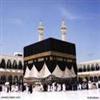
It is pertinent here to narrate some verses of the Holy Qur’an which are said by the exegetes to have been revealed about Hadrat Khadija or are related to her.
Khadija, the Chosen and Purified
“And when the angels said: O Mary! Surely Allah has chosen you and purified you and chosen you above the women of the world.” (3:42)
The addressee of the above Qur’anic verse is Holy Mary and refers to her superiority, purity and perfection, but on the basis of the following explanation, one may infer that one of the addressees of this verse is Hadrat Khadija as well: Exegetes such as Al-Qartabi, Tabarsi, Ibn Kathir, and Al-Alusi al-Baghdadi in their interpretation of the said verse, relying on a saying of Prophet Mohammad have said:
the Prophet has said: the superiority of Khadija over the women of my Ummah is just like that of Mary over the women of the world. Imam Ali has been quoted as saying: Prophet Mohammad said: the best of women are Mary, daughter of Imran and Khadija, daughter of Khuwaylid (Iban Kathir interpretation, vol. 1, p. 323). It indicates that another referent of the abovementioned verse is Hadrat Khadija.
The traditions mentioned by the exegetes in their interpretation of the abovementioned verse support the above contention. They have mentioned the name of this outstanding lady of the world. Al-Qartabi says: the appearance of the verse indicates that Holy Mary is superior to all world’s women and next to her is Hadrat Fatima, next to her is Hadrat Khadija and next is Asyia. (Jami’-ul-Ahkam, vol. 4, p. 59). This is what can be inferred from the words of the holy Prophet.
Khadija’s Role in Financial Support of the Holy Prophet
“Did He not find you in need and made you free from want?” (93: 8)
In his interpretation of the Qur’an, relying on a narration from Ibn Abbas, Furat Kufi explains that Khadija was a financial source to make Prophet financially free from want. He says: Did he not find you a wanderer and so He guided you [towards prophecy]? He adds: Did He not find you in need and made you free from want [through Khadija]? (Furat Kufi, tradition no. 730).
Some exegetes (Zamakhshari in Kashaf, vol. 4, p. 768; and Allama Tabataie in Al-Mizan, vol. 11, p. 20) maintain that needlessness here refers to economic and financial issues.
However, the fact that the verse refers to a general issue and also a narration from Imam Rida who says: God the Almighty made him needless by fulfilling his supplication (Safi, vol. 4, p. 342; Kinz ul Daqaiq, vol. 14, p. 321), indicate that Khadija was a human factor (assigned by God) and by providing the Prophet with material assistance prepared the grounds for his spiritual and material needlessness.
Al Qartabi in his interpretation of the said verse states: God made you needless through Khadija (Al-Jame ul Ahkam, vol. 20, p. 72).
___________________________
* Translated by: Sadroddin Musawi
source : abna













